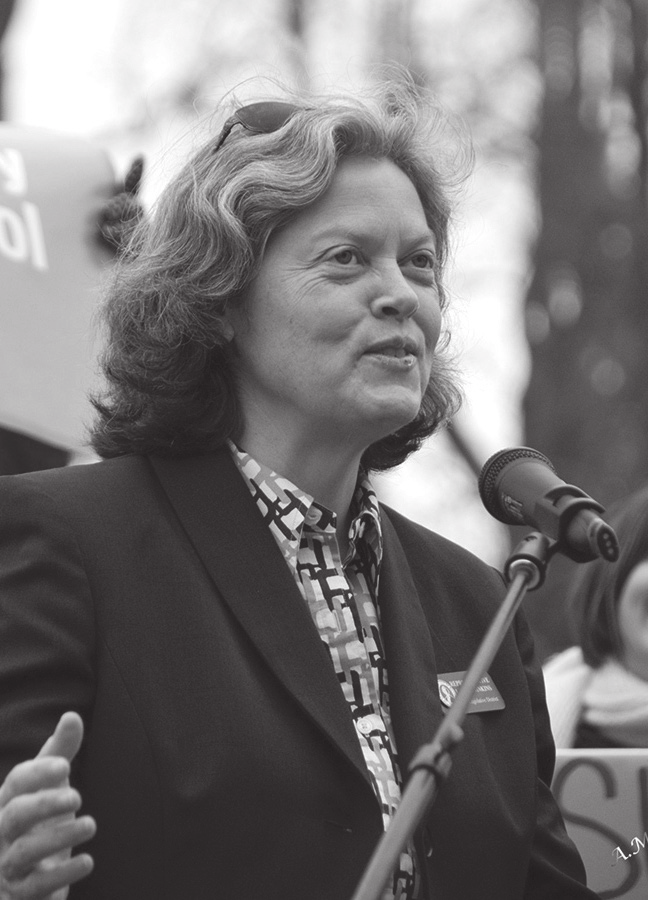By Val Bauer

HB (House Bill) 1962 is a bill written in order to require private colleges in Washington state to elucidate the rules of the student conduct process for students. The abstract included in the bill is: “AN ACT Relating to disciplinary procedures at private institutions of higher education.” HB 1962 was written by State Rep. Laurie Jinkins, who “represents the 27th Legislative District in Pierce County,” according to the Washington House of Democrats website. The 27th Legislative District includes “East, Downtown, Hilltop, North, Northeast, West, and part of South Tacoma as well as Ruston and Fife Heights,” the website said. Jinkins appeared before the Higher Education Committee for the first time in seven years. “I’ve never had a bill in this committee before,” she said. “There were some students in my district who were attending one of the private universities who did run into a disciplinary issue,” these students being the UPS 3.
“I personally advised some of their advisors, ‘Follow the rules in the student handbook.’ That really started me thinking, ‘Well, what are the rules?’” Jinkins said. Alex Arkfeld, legal intern with the Office of Program Research, began the case with a briefing of the bill’s background. “The procedures afforded to students in disciplinary proceedings are dependent on whether a college or university is public or private,” Arkfeld said. When Jinkins examined the rules governing private institutions, she found that “unlike our public institutions, which have to follow the Administrative Procedures Act (APA) and there are legal due process requirements, there is, in order to be accredited, a very generic statement that a private university has to have rules, but it is not particularized at all,” she said. Board of Trustees meeting met with frustration, divestment issue continues
“Students at private institutions who believe that their disciplinary proceedings lacked adequate procedural safeguards may be limited to bringing a contract claim based on the institution’s student handbook or code of conduct,” Arkfeld said. While the bill was based on Puget Sound’s conduct rules, Jinkins said that the University has more policies regarding disciplinary procedures than many other schools. Jinkins wanted other schools to follow our lead.
Testifying in support of the bill was Lydia Gebrehiwot, Akilah Blakely and Andres Chavez of the UPS 3, students of University of Puget Sound who are currently facing a three year suspension over the University’s “decision to suspend them for allegedly posting a controversial flier on campus,” according to the News Tribune. Gebrehiwot, Blakely and Chavez “will neither confirm nor deny that they were responsible for the flier.”
Testifying against the bill was Puget Sound’s Dean of Students Mike Segawa, as well as President of Saint Martin’s University, Dr. Roy Heynderickx. Heynderickx is also a board member at the Independent Colleges of Washington. Regarding HB 1962, Dean Segawa released in a statement to the Trail, saying that “along with other member colleges of Independent Colleges of Washington, we are concerned that the bill is poorly crafted and redundant.”
“All of our institutions already have conduct processes, which are based on best practices, are well documented, and are intended to be educational and restorative rather than punitive,” Segawa said. “We are already subject to the oversight of an accreditation process that evaluates all aspects of the college, and believe that decisions related to operation of the college are best left to the campus community rather than the state,” Segawa said.
At the hearing, Heynderickx said that the bill is “an inappropriate intrusion into the disciplinary affairs of our colleges. This is just not how, in our experience, good legislation is created, and perhaps why the bill you are considering has significant legal and implementation shortcomings,” Heynderickx said.
“Disciplinary procedures on all college campuses are not intended to parallel the adjudicative processes found in criminal or civil proceedings processes that this bill seeks to require,” Heynderickx said.
“While the bill isn’t moving forward this year,” Jinkins released in a statement emailed to the Trail, “I’m pleased that the Independent Colleges of Washington have expressed a desire to work with me on the issue during the interim.” Jinkins’ “legislative priorities include improving our schools and health care, helping working families and transforming Washington’s revenue structure.”
“I’m proud of the UPS 3 for sharing their story during public testimony on the bill. Every college or university student should expect that if they’re accused of violating the student code of conduct, there are policies and procedures in place that apply both to them and to the institution,” Jinkins wrote.
